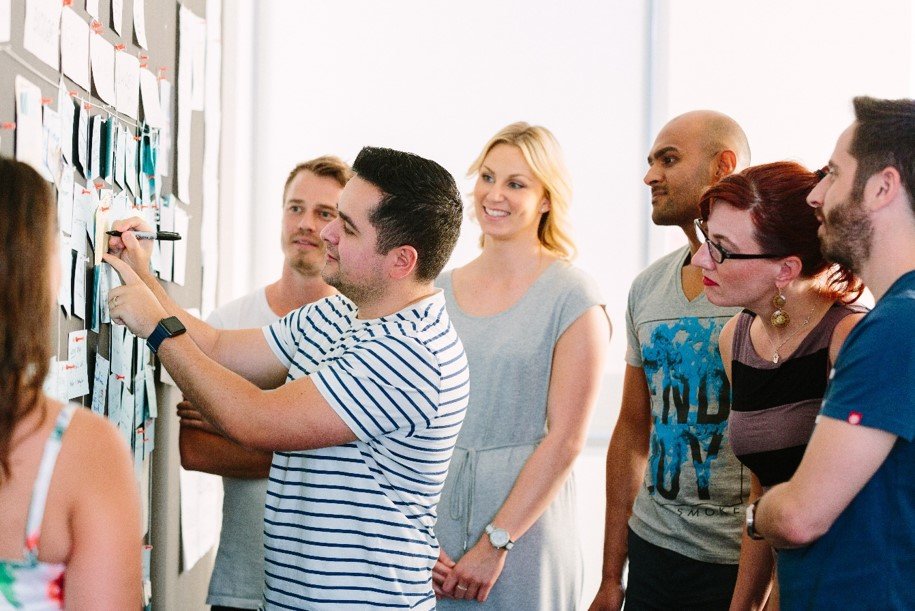
Innovation is being overused as a fad word. Innovation is not just a department on level six. Innovation is something large organisations in New Zealand simply aren’t doing enough of. Innovation is something we’re at serious risk of falling behind in.
Those are some of the key findings of a new white paper from ZeroPoint Ventures about the state of innovation in Aotearoa. Titled “Growing Your Enterprise at Startup Speed,” the white paper states that large businesses and organisations in New Zealand need to adopt an agile, start-up culture to innovate and stay ahead of changing technologies, industry trends and consumer demands. It reveals that New Zealand’s bigger businesses are failing to innovate at the speed that’s necessary for sustaining their long-term impact. And, direr, it warns that the Land of the Long White Cloud’s economic success is likely to decline over the next 10 years, unless significant transformation takes place at the centre of New Zealand businesses.
“Most large organisations started as start-ups once upon a time,” says ZeroPoint Ventures co-founder Dan Khan.
Fellow ZeroPoint Ventures co-founder Jane Treadwell-Hoye expands on this. “We have a long tradition of entrepreneurial thinking and behaviours, but that seems to have been lost. Traditional organisations, due to their scale and structure, are not designed for fast, continuous ideation and innovation cycles truly focused on the customer. The very essence of their success has been built on a history of product-centric, operational excellence, and process improvement efficiency.”

She says more. “We believe innovation has become a bit of a fad word. But there needs to be a culture of change and mindset. A lot of times, ‘innovation’ is a department up on level six where it’s led by a team. It really should be everyone.”

ZeroPoint Ventures co-founder Jane Treadwell-Hoye.
Part of the issue, Treadwell-Hoye says, is larger organisations are too risk-averse – which can harm entire industries and regions if they’re not using their greater resources (at least in comparison to most start-ups) as much as they can to innovate. “This is about being more risk-embracing, not risk-adverse,” she explains. “People need to be better at risk-taking.”
In recent years, corporate New Zealand has left money on the table as they struggle to engage with early innovators who are creating new products and services in new and emerging sectors. As Treadwell-Hoye explains: “There are no clear engagement models for corporates and startups to work together. Yet large enterprises need to embrace a culture of continuous innovation to transform.
“What we started to realise is that while corporate innovators are trying their best to create new horizons of innovation ‘inside the building,’ many have forgotten how to approach new ideas and new product development the way a startup would. New Zealand companies need to keep up with a disruptive innovative market and reactivate the entrepreneurship that was once alive in their own DNA.”

Recent data from Statistics New Zealand shows the Land of the Long White Cloud is still a country of small businesses with fewer than one percent (2,460 enterprises) employing more than 100 employees. Those 2,460 enterprises employed 47 percent of all employees in New Zealand.
In order to embrace innovation, Treadwell-Hoye says organisations need an entrepreneurial mind shift – which she says is different than a mindset in that it involves the entire organisation and is continuous. “I don’t think any organisation is ever finished. It’s a continual innovation period.”

Inside MYOB’s offices.
The white paper isn’t all doom and gloom, however. It also highlights specific large organisations that it claims are embracing an entrepreneurial mind shift, helping spur innovation and competitiveness while benefitting the organisation.
One of those companies highlighted is accounting software and payroll solutions provider MYOB. According to MYOB general manager Carolyn Luey, a few years ago the company began transitioning from primarily providing desktop software to the cloud, which was done to adapt to new technologies and competitors which were threatening MYOB’s business. “The best way of developing software now is with an agile mindset,” she explains. “In today’s digital world, you need different ways of driving innovation and entrepreneurship.”
According to Luey, MYOB uses “trajectory planning,” where it looks at trends and megatrends (such as artificial intelligence, robotics and big data) expected to occur in the next 10 years. The organisation then works backwards for more immediate entrepreneurial opportunities, leading to innovation. And this, Luey says, is because disruption is inevitable. “As a business, it’s always important to keep your eye on the future, and how the world is changing.”

MYOB general manager Carolyn Luey.
Treadwell-Hoye says there’s a reason MYOB is an example of a large organisation that appears to have the right idea. “The businesses of tomorrow will win with digitally-led, customer-centric experiences,” she explains.”
Khan says the white paper may sound alarming, but it doesn’t need to be. “There’s not an easy solution,” he says. “There’s no playbook. There needs to be an aspiration to be a business of tomorrow rather than a business of today. There’s a lot of talk about innovation, but not as much about entrepreneurship. [And] it shouldn’t just be a couple of month’s programme.”





